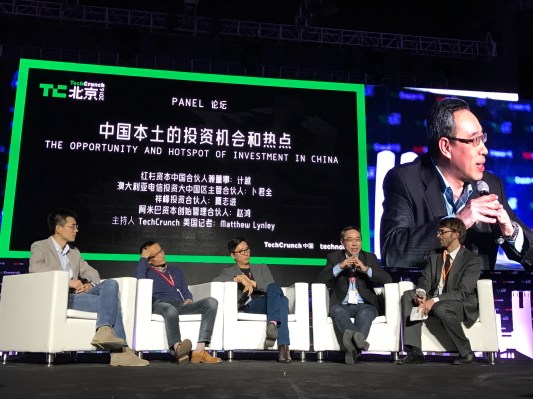Enterprise startups may not be overtly or obviously sexy, but they are already commanding the attention of China’s top investors. That’s according to a collection of leading VCs who took to the stage for a panel discussion at TechCrunch Beijing 2016.
“[We made] more investments in enterprise applications than consumer applications in China in last year,” Steven Ji, director and partner at Sequoia Capital China, remarked. “A starting point [is] to rip up the enterprise solution chart. That’s the reason, starting last year, we started to invest more in enterprise solutions than consumer in China.”
“This is a very hot investment in VC community,” Juncong Zheng, managing partner at Vertex Ventures China, added in agreement.
“We are trying to find those kinds of startups which can improve the efficiency of all kinds of customers [and] attract big customers like Fortune 500 companies, which can pay a lot of money for those kinds of services,” he added.
Outside of business ventures, public services and government areas are also ripe for enterprise solutions.
Andrew Hong Teoh, founder and managing partner at Ameba Capital, told the audience that he believes healthcare systems and public bureaus — where “a host of data” exists — are ideal focuses.
“Enterprise solutions go in tandem with a country’s economic development. Squeezing out efficiency [and] generating more money… you’re already getting solutions that will squeeze more ROI from your investments on the cost side,” Teoh explained.
[gallery ids="1413202,1413201,1413196"]
Another major topic up for debate this afternoon in Beijing was the impact that China’s top companies are having on the field of investment in the country. In particular, the impact that exits have on creating new ventures, new sources of investment and other important pillars that any growing startup ecosystem requires.
“You see this during the whole cycle… whenever [a company] goes to IPO, you see [employees] start leaving. That’s why you have the Alibaba mafia gang, the Tencent mafia gang… the next one will be the next big internet IPO that comes up. My own personal interest, I hope it will be Didi, but good luck to every one of them,” Teoh said.
Sequoia Capital China partner Ji said he believes that the best parts of China’s tech space are comparable to the U.S., having improved significantly thanks to many people getting a sound tech education and background from working with big companies like Baidu, Alibaba and Tencent — the so-called BAT.
Furthermore, the big firms are helping create specialisms in AI, VR, AR and other emerging technology, which will help birth new startups in these spaces, according to Zheng
“The spring of the technology innovation is coming and I am glad to be part of it,” he added.
That enthusiasm is also rife among those who are still to enter the workforce, a crucial component to creating entrepreneurs and investors of the future, too.
“In terms of formal organization, China is the last. But in terms of activity, it is really high — a lot of younger people want to be startup,” Telstra Ventures Partner Chris Pu summarized.
